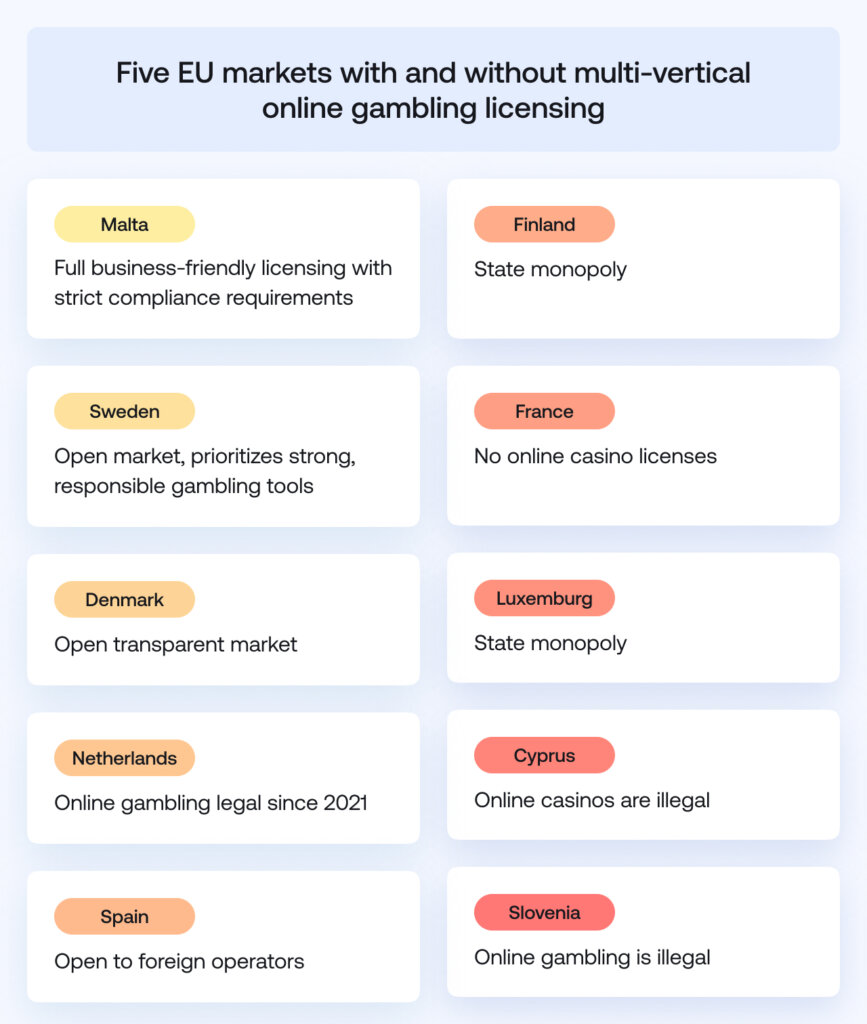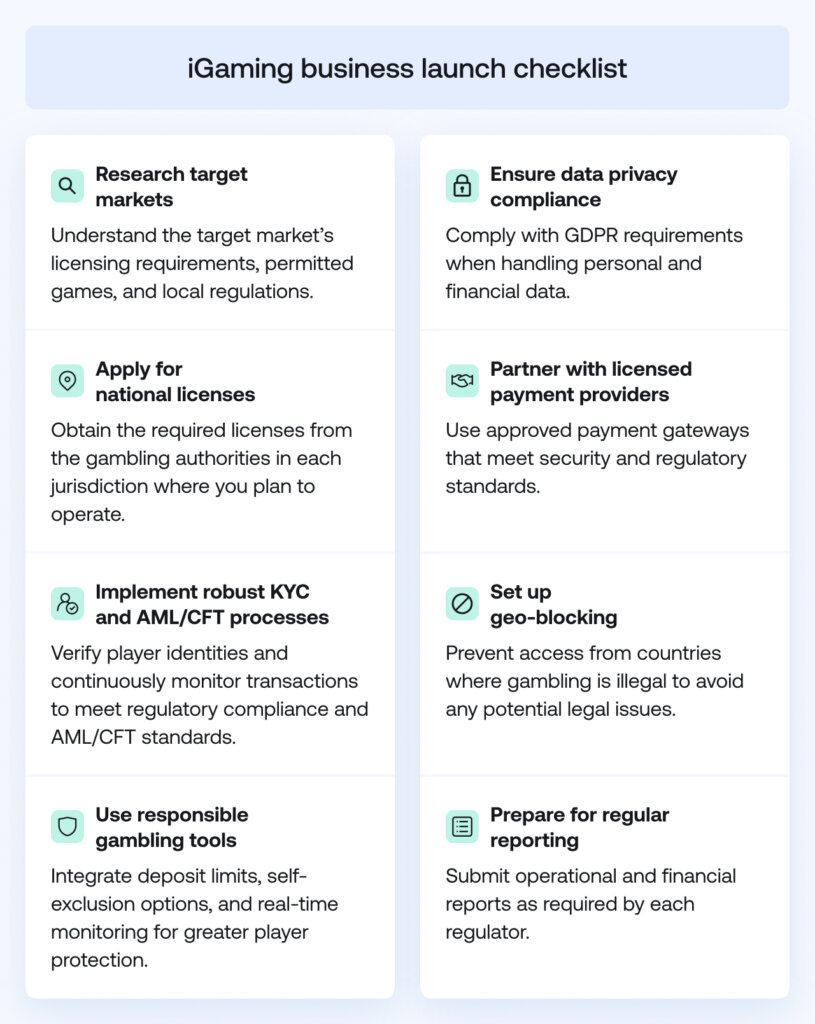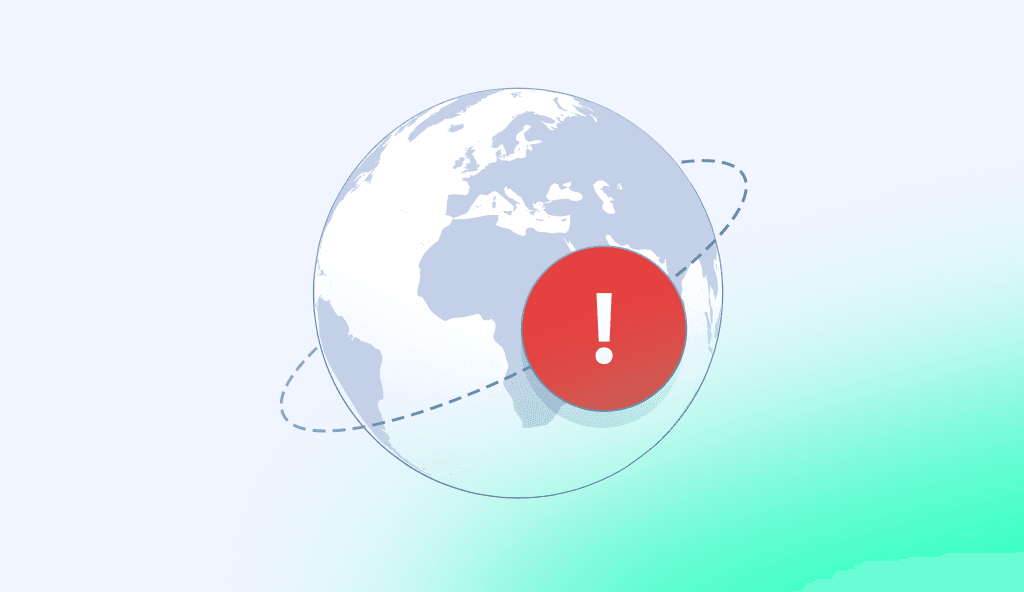- Jul 25, 2025
- 8 min read
Gambling Regulations in the EU: Where Online Gaming Is Legal and How to Stay Compliant (2025)
Discover where online gambling is legal in the EU, how iGaming is regulated across member states, and key steps for operational compliance.

Last year, European online gambling revenue increased to nearly €48 billion ($55.6 billion) and is set to grow even more in 2025. Given the market’s size, the assortment of national laws and regulations in the EU makes it an even more complex sector to navigate.
With each EU country responsible for its own rules on licensing and compliance, understanding the legalities of online gaming and how to operate within the rules is essential not only for players and operators, but especially for businesses looking to scale across the region.
This article provides a clear overview of the current landscape, key licensing frameworks, and crucial steps for compliance to help make sense of the varied and evolving EU iGaming landscape.
Disclaimer: In this article on The Sumsuber, the terms online gambling and iGaming are used interchangeably. Please note that online casinos—while covered in some sections—are not synonymous with online gambling as a whole. Online casinos (also known as virtual or internet casinos) represent just one form of online gambling.
Is online gambling legal in the EU?
Yes, online gambling is legal in many EU countries, but regulations vary. Online gambling involves any activity where something of value is wagered on an uncertain outcome—for example, online casinos, sportsbooks, lotteries, poker, slots, horse racing, and more.
While no EU country completely bans all forms of gambling, several member states either prohibit or do not license online gambling. Thus, the scope and legality of online gambling vary significantly across the EU.
What are the key differences in gambling laws across EU countries?
Gambling laws across the EU vary widely. Some embrace open markets, while others maintain tight restrictions or monopolies.
Five EU markets with and without multi-vertical online gambling licensing

EU countries permitting multiple online-gambling verticals
This list highlights some, but not all, of the open EU iGaming markets with a competitive licensing system.
- Malta: Home to the Malta Gaming Authority (MGA), one of Europe’s leading gambling regulators
- Sweden: Allows remote operators under the Swedish Gambling Authority (Spelinspektionen)
- Denmark: Operates a liberal licensing model under the Danish Gambling Authority (Spillemyndigheden)
- Spain: Regulated by the Dirección General de Ordenación del Juego (DGOJ), with open licensing at the national level, but subject to significant regional and advertising restrictions. Operators must ensure compliance with both national and autonomous community regulations.
EU countries with product restrictions or state monopolies
These jurisdictions either prohibit certain types of games or are partially regulated.
- France: Allows online sports betting and poker, but not online casino games
- Austria: Private monopoly for casino and lottery games. Online betting is regulated and licensed at state level.
- Poland: Only state-run Totalizator Sportowy may operate online casino games. Private operators are restricted to online betting, subject to high taxes and strict regulatory oversight.
- Finland: Online gambling is run through a state-owned monopoly operator (Veikkaus). However, in March 2025, the Finnish government proposed a new law to overhaul this system, planned to end Veiikaus’s exclusive control over online gambling, and move to a licensing regime.
Suggested read: Guide to iGaming Laws and Regulations Around the World: Is iGaming Legal in Europe?
How are online gambling activities regulated across Europe?
There is no unified regulatory framework for online gambling in Europe; each member state has its own regulatory framework. This means operators in the EU have to navigate licensing rules, tax rates, and advertising laws on a country-by-country basis. While some member states allow private companies through competitive licensing systems, others restrict online gambling to state-owned monopolies or even impose strict conditions on operations.
Here’s a comparison of how different EU member states regulate iGaming:
| Member state | Licensing | Permitted games | State monopoly | Notes |
| Malta | Open licensing via MGA | Casino, sports betting, poker, lottery | No | Major iGaming hub; home to many B2B and B2C operators |
| Germany | Interstate Treaty (GlüStV, since 2021) | Sports betting, virtual slots, online casino, poker | Yes (table games and lotteries) | €1,000/month default deposit cap; many financial restrictions with strict advertisement regulations |
| Sweden | Open licensing via Spelinspektionen | Online casino, betting, poker | Yes (lotteries) | Strong focus on responsible gambling; mandatory self-exclusion tools |
| France | Regulated by ANJ (Autorité Nationale des Jeux) | Sports betting, horse racing, online poker | Yes (lotteries) | Online casinos are prohibited; stringent advertisement controls |
| Netherlands | Open licensing via Kansspelautoriteit (KSA) | Online casino, sports betting, online poker | Yes (lottery and some games) | Legal since 2021 |
| Finland | State-run monopoly (Veikkaus) | Limited; only via Veikkaus | Yes | Monopoly system expected to end by 2026 |
| Poland | Local license required | Sports betting, limited casino games | Yes (Totalizator Sportowy for online casino) | High taxes and tight restrictions |
Which EU countries allow online casinos?
Most EU member states allow online casinos, but the degree of legality and access varies. While some offer full licenses to private operators, others reserve online casino games for state-run monopolies, and others ban online casinos outright.
Permitted online casino framework
These countries permit private companies to operate online casinos under national licenses:
- Malta
- Bulgaria
- Sweden
- Denmark
- Netherlands
- Italy
- Spain
- Estonia
- Greece
- Lithuania
- Portugal
- Romania
- Latvia
- Czech Republic
- Ireland (pending new regulator rollout in 2025)
State-controlled online casino offerings
Online casinos are allowed, but with significant restrictions like state monopolies:
- Germany: Online slots are federally licensed under the 2021 Interstate Treaty, but strict deposit limits apply; table games (casino games) are reserved for state-level monopolies
- Poland: Only state-run Totalizator Sportowy may offer online casino games
- Austria: Casino monopoly retained by Österreichische Lotterien
- Finland: Monopoly model under Veikkaus; reform planned for 2026
- Slovakia: Market access is limited, with the government having taken enforcement action against major international operators
- Croatia: Online gambling is legal, but licenses are tied to land-based operations for online casino games and betting.
- Belgium: Online casinos must partner with land-based casinos
- Hungary: Online licenses can only be granted to operators that hold a land-based casino license in the country
Online casinos are illegal or not regulated
- Cyprus: Online sports betting is allowed, but online casino games are illegal
- Luxembourg: No online gambling licensing process in place yet.
- Slovenia: Online casinos are legal if operated by state-licensed domestic land-based casinos or the national lottery. All other casino operations, including those run by foreign or unlicensed companies, are illegal.
- France: Online poker is allowed, but online casino games (slots, blackjack, etc.) are not, although there have been announcements that the country may allow online casinos in 2025.
What licenses are required for online casinos in the EU?
There is no single EU license for online casinos. Each country in the EU has its own national licensing authority and regulatory framework. Licensing can also be granted at a regional level, such as in autonomous communities in Spain.
Non-EU jurisdictions associated with EU member states
Jurisdictions such as Curaçao—though part of the Kingdom of the Netherlands—as well as Greenland and the Faroe Islands (which belong to the Kingdom of Denmark), or French Overseas Territories, are not part of the EU and do not issue EU-recognized licenses.
To operate legally within a specific EU country, an online casino must obtain a national license from a domestic gambling regulator.
Top EU regulatory bodies for online casinos
| Country | Regulatory authority | Games covered | Notes |
| Malta | Malta Gaming Authority (MGA) | Online casino, betting, poker | Highly respected hub with B2C & B2B iGaming licenses; used by many EU-wide operators |
| Sweden | Spelinspektionen | Online casino, betting, poker | All operators must integrate with Spelpaus, a nationwide self-exclusion system |
| Denmark | Danish Gambling Authority (Spillemyndigheden) | Online casino, betting, poker | Transparent and competitive licensing regime |
| Netherlands | Kansspelautoriteit (KSA) | Online casino, betting, poker | Advertising and bonus use are closely monitored |
| France | Autorité Nationale des Jeux (ANJ) | Betting, poker (no online casinos allowed) | Only sports betting, horse racing, and poker are allowed |
| Italy | ADM (Agenzia delle Dogane e dei Monopoli) | Online casino, betting, poker | National license required for all iGaming activities |
| Spain | Dirección General de Ordenación del Juego (DGOJ) | Online casino, betting, poker | Licensing may also be at an autonomous community level |
| Germany | Gemeinsame Glücksspielbehörde der Länder (GGL) | Online casino, betting, poker | There may be monopolies at a state level |
| Poland | Ministry of Finance | Betting; casino monopoly | Private licenses only for sports betting; online casino games are state-run |
| Finland | Veikkaus (state monopoly; no licensing) | N/A | Reform and licensing system planned for 2026 |
Suggested read: Top 10 Gambling-Friendly Countries (2025)
How do online gambling operators stay compliant with EU regulations?
To legally operate across EU jurisdictions, online gambling and iGaming companies must comply with strict regulations when applying for a license and in day-to-day operations. Rules vary by country, but the following steps are essential across most EU markets:
- Obtain a local license: Apply directly to the national gambling authority in each target market.
- Implement KYC and AML procedures: Comply with the national AML/CFT legislation and EU-wide Anti-Money Laundering Directives (AMLDs), verify player identity before allowing deposits, bets, or withdrawals.
- Offer responsible gambling tools: Offer features like deposit limits, self-exclusion, time-outs, and reality checks to promote responsible gambling.
- Use approved payment providers: Partner only with regulated PSPs and ensure secure handling of funds and customer data under GDPR.
- Geo-block prohibited jurisdictions: Block access from countries where gambling is illegal.
- Display licensing information clearly: Publish license details, terms and conditions, privacy policy, and responsible gambling links and disclaimers on the website.
- Submit regular reports to regulators: Most EU regulators require operators to submit financial and operational reports on a monthly or quarterly basis. Incident reporting is typically triggered by specific events such as system failures, breaches, or suspicious activity.
- Stay up to date on regulatory changes: Laws change frequently, so it is essential for operators to constantly monitor regulatory updates and adapt their practices accordingly. Staying informed about new legislation, amendments, and interpretations is crucial for maintaining compliance and operating successfully in the evolving online gambling landscape. Businesses must be proactive in their approach to ensure that they adhere to current regulations and can swiftly adjust to any changes that may arise.
Crypto gambling in the EU
While EU gambling regulators do not directly regulate cryptocurrencies, some jurisdictions assess crypto-related gambling activity through existing gambling or AML/CFT frameworks. Regulatory approaches vary - some permit crypto payments under strict AML/CFT obligations, others prohibit them outright.
Estonia does not explicitly regulate cryptocurrency as part of gambling activities. However, licensed gambling operators are subject to strict AML/CFT requirements, and crypto may be considered a high-risk payment method subject to enhanced due diligence.
The Malta Gaming Authority (MGA) previously operated a sandbox framework from 2019 to 2023, allowing licensed operators to test the use of cryptocurrencies and blockchain technology. This was formally replaced in January 2023 with the ‘’Policy on the Use of Distributed Ledger Technology by Authorised Persons.’’ Under this new policy, gambling operators may use crypto (classified as Virtual Financial Assets) with prior MGA approval and must meet rigorous KYC, AML/CFT, and technical standards. Austria and other EU countries prohibit or restrict the use of cryptocurrencies for gambling, especially in physical venues like casinos, even if online gambling is permitted. Crypto is often treated as a non-transparent method, triggering heightened compliance scrutiny.
The European Gaming and Betting Association also recently announced it would rewrite Anti-Money Laundering (AML) rules by 2026, aligning with EU crypto and compliance standards.
Upcoming EU Know Your Business (KYB) compliance changes in 2026
As part of the EU’s new AML legislative package, significant changes to Know Your Business (KYB) obligations will come into effect by 2026. Gambling operators need to prepare for significant implications as a result of these changes.
The key regulation to watch is Regulation (EU) 2024/1624, which established the new Anti-Money Laundering Authority (AMLA). It expands compliance obligations for both financial and non-financial sectors, including iGaming companies.
What’s changing?
- KYB checks will become stricter and more standardized across the EU, requiring gambling operators to verify and document the ownership structure and control of any third-party businesses they work with.
- Operators will need to collect and verify more company data, including Ultimate Beneficial Owner (UBO) information, source of funds, and company registration details.
When does it take effect?
- Regulation (EU) 2024/1624 entered into force in July 2024, but most provisions, including the updated KYB obligations, are not fully enforceable until mid-2026.
- Member states and obliged entities like gambling operators are expected to begin adapting systems and procedures in 2025.
The goal is to unify AML/KYB standards across the EU and close regulatory loopholes that allow fraud, money laundering, and abuse of business partnerships in high-risk sectors like gambling.
Non-compliance may result in severe penalties, including fines, licence revocation, or blacklisting at the EU level.
Is sports betting legal in Europe?
Yes, sports betting is legal and licensed in most European countries, though the exact rules vary by jurisdiction. Countries where sports betting is legal and licensed include:
- Germany
- Italy
- Spain
- France
- Sweden
- Denmark
- Netherlands
- Ireland
- Poland
- Belgium
- Austria
- Portugal
- Czech Republic
- United Kingdom (not in the EU but a key European market thanks to its large player base, respected regulatory regime, and industry innovation)
That being said, rather than asking “Is sports betting legal in Europe,” it’s better to consider whether sports betting is legal in a particular EU member state.
Suggested read: Arbitrage in Sports Betting: How Can Businesses Detect It? (2025)
Top 2025 trends in EU gambling regulation
Several significant trends are influencing how EU countries regulate online gambling:
AI-based risk scoring
Operators are increasingly making use of AI and machine learning tools to monitor player behavior and identify early signs of problem gambling or fraud.
Rise of AI use in compliance
Regulators may also expect operators to use advanced tools like AI to assist in regulatory compliance obligations.
Tighter crypto restrictions
The EU in general requires full transparency and traceability for payments, including with digital assets, aligning with AMLD standards.
Emerging pan-EU coordination
While a uniform framework for online gambling in Europe remains distant, regulators are aligning AML and KYC standards through the establishment of the EU Anti‑Money Laundering Authority (AMLA) and participation in regulatory forums.
Bans on advertising and bonus promotions
Authorities in many countries, like Belgium, are placing restrictions on online gambling advertising and bonus promotions, particularly targeting vulnerable groups like young audiences.
Greater focus on player protections
This may include more mandatory tools like robust self-exclusion registers, affordability checks, and gambling limits.
Suggested read: Ask Sumsubers: How are global iGaming regulations expected to change in 2025 and beyond?
How to launch or operate an iGaming business in the EU
Launching or operating an iGaming business in Europe requires considerable planning, regulatory knowledge, and ongoing compliance.

Ready to take the next step?
The best way for gaming operators to stay compliant, reduce fraud risks, and protect their reputation is to use Sumsub’s full-cycle verification and fraud prevention solution for iGaming.
With Sumsub, you can:
- Securely onboard players from over 220 countries and territories in under 30 seconds
- Use Non-Doc Verification where allowed
- Verify identity and address documents in any language within a minute
- Onboard only age-verified gamers
Sumsub also prevents all gambling-specific fraud in real-time, including promo abuse and account takeovers.
-
Is online gambling legal in all EU countries?
No, online gambling is not legal in all EU countries. For example, online gambling is illegal in Luxembourg. While many member states allow and regulate online gambling, others maintain strict restrictions or state monopolies.
-
What is the best EU license for online casinos?
The Malta Gaming Authority (MGA) license is widely regarded as a reputable EU license due to its stringent standards and broad acceptance. However, the best license depends on the target market. Countries like Sweden, the Netherlands, and Denmark, for example, offer locally respected licenses.
-
Which countries ban online casinos in Europe?
Several European countries restrict or ban online casinos. For example, online casino operations are prohibited in France.
-
How can iGaming platforms comply with EU regulations?
This depends on the EU member state. In general, iGaming platforms can comply by obtaining local licenses, implementing strong KYC and AML procedures, offering responsible gambling tools, ensuring data protection under GDPR, and adhering to advertising and reporting requirements set by each country’s regulator.
-
Do iGaming companies need separate licenses for each EU country?
Yes. There is no unified EU-wide license, which typically means companies must obtain individual licenses in each country where they operate. Some countries, such as Bulgaria and Ireland, do, however, recognize licenses from other EU states, such as Malta.
Relevant articles
- Article
- 3 weeks ago
- 20 min read

- Article
- 1 week ago
- 13 min read
How to check if a company is legit: a step-by-step guide for businesses and consumers covering registrations, licenses, reviews, and scam warning sig…

What is Sumsub anyway?
Not everyone loves compliance—but we do. Sumsub helps businesses verify users, prevent fraud, and meet regulatory requirements anywhere in the world, without compromises. From neobanks to mobility apps, we make sure honest users get in, and bad actors stay out.




